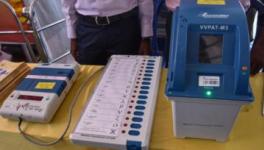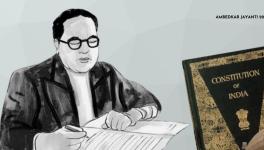Shaheen Bagh: Protesters’ Bail on Condition of Not Talking or Writing About CAA-NPR-NRC
New Delhi: Three men arrested in connection with violation of the lockdown, by refusing to call off 101-day protest against the Citizenship Amendment Act (CAA) at Shaheen Bagh in Southeast Delhi, were released from Tihar Jail on bail on March 29. The court accepted their bail applications on the condition that they won’t speak to the media or post anything against the CAA, the National Population Register (NPR) and the proposed National Register of Citizens (NRC) on social media—which is being perceived by many as curtailment of their freedom of expression.
The trio—Syed Taseer Ahmed, Syed Masood Ahmad and Shan Mohammed—was arrested under several sections of the Indian Penal Code (IPC) and the Epidemic Act have also been asked not to post anything against the CAA, NPR and the NRC even on instant messaging platforms such as WhatsApp.
“...[T]he applicant shall not be posing any opinion regarding the Citizenship Amendment Act/National Population Register/National Register Citizen on any social media, instant messengers nor will be giving any interview in this regard to print and electronic media,” stated Clause IV of the bail order dictated by Jitendra Pratap Singh, Duty Metropolitan Magistrate for Southeast district at Saket Court.
Defence lawyers Advocate Dipika Jain, Advocate Seema Misra, Advocate Tarique, Advocate Firoz Iqbal Khan and Advocate Rashid Azam sought bail on the grounds that the accused do not have any criminal involvement except the present case and that they might get infected by novel coronavirus if detained for long. They also told the court that they would abide by any condition imposed by the court if their bail applications are admitted.
On the other hand, Advocate Pravesh Vyas, additional public prosecutor representing the State, opposed the bail application arguing that the applicants have disobeyed the directions of the state government and of the Union government regarding the lockdown and prohibition of protest gatherings that were issued to prevent the spread of coronavirus and therefore, he cannot claim release on bail.
He further argued that the accused did not pay heed to the directions of the police officials to remove himself from the protest site and that he, in fact, had obstructed the police from discharging their duties. The accused, if released on bail, the prosecution told the court, might mobilise a large crowd at the protest site and the same might pose problems for law and order.
However, the court noted that the only offence, which is non-bailable, invoked against the accused is the IPC’s Section 353 (assault or criminal force to deter a public servant from discharge of his duty). The court also said the prosecution did not dispute that apart from the instant case, the accused has no criminal involvement. The other sections slapped against them are 186 (obstructing public servant in discharge of public functions), 188 (disobedience to order duly promulgated by public servant), 341 (wrongful restraint), 269 (negligent act likely to spread infection of disease dangerous to life) and 34 (acts done by several persons in furtherance with common intention). They have also been booked under Section 3 of the Epidemic Diseases Act, which is read with Section 188 of the IPC.
Mentioning the directions recently passed by the Supreme Court and the Delhi High Court regarding de-congestion of overpopulated prisons in view of the COVID-19 threat, the Duty MM accepted the bail applications, ordering the accused to furnish a personal bond of Rs 25,000 with two sureties of like amount.
Also read: Anti-CAA Protesters from Rajasthan’s Baran Languish in jail
Describing the order “stringent” and in “violation” of the fundamental right to freedom of speech guaranteed under Article 21 of the Constitution, one of the arguing lawyers, Advocate Firoz Iqbal Khan, told NewsClick, “From legal point of view, even the arrests do not stand in the eyes of law, no matter what allegations the prosecution levels against them; because most of the charges slapped against them are bailable. There was no violence. It was a women-led protest. And this is corroborated with the fact that even the Supreme Court had appointed interlocutors to talk to the protesting women so that a solution for access to the road could be reached.”
The arrests and detentions were made in two sets: in the first lot, six women and three men were taken into custody, while in the second, there were two male and two females. Except the three who were arrested and later remanded to judicial custody, the rest were released from the police station on individual personal bonds furnished before the police.
“In the first lot, six women — if the charges sustain — should be the prime accused because it was their protest. But they were released from the police station on a simple undertaking. Only these three people were arrested. They were arrested on March 24 morning and illegally kept in the police lock-up for 24 hours. A false information was passed to us that they would be produced in Saket Court on March 25. When we reached there, we were informed that they would be produced before a magistrate in Tihar jail in the next five minutes, making us impossible to reach there. Producing them in the prison came as a surprise to us as the Duty MM was sitting at the Saket Court. Finally, they were sent to judicial custody. This was something like a strategy arising out of a possible bias of the police against the three accused,” he said.
All the IPC sections slapped against the three were bailable except Section 353, which attracts an imprisonment of not over two years. “The police and later, the magistrate who remanded them to judicial custody, had the discretion to release them on an undertaking even without any bail application on the ground of parity. But unfortunately, the law was set aside,” Khan alleged.
When sought his reaction on the conditions imposed against his clients, he concluded, “The order directly hits the accused persons’ freedom of speech guaranteed under Article 21 of the Constitution. We will certainly challenge it. When the situation is grave, you have to set your priorities. We did not oppose the restrictions imposed as our priority was to secure their release as there is a risk to their lives in view of the coronavirus outbreak. We believe that the police action against the protesters is contempt of court as the matter was subjudice in the apex court. We will strategise our future course of action.”
The round the clock sit-in at Road Number 13A (Sarita Vihar-Kalindi Kunj-Noida highway) against the CAA, the NPR and the proposed NRC was forcefully removed by the police on March 24 morning after the government ordered a complete lockdown and physical distancing to prevent community transmission of COVID-19. By then though, keeping the government’s orders for social distancing in mind, the women protesters had decided to continue the nearly 100-day protest with the help of only five or six women present at the site on rotation basis and maintaining a physical distance between them, while keeping shoes of other women around the site as a token of their presence.
The second major issue was blockade of the road, which links Noida in Uttar Pradesh to Delhi and Faridabad in Haryana. Lakhs of commuters use this road every day to reach their offices and other business activities.
Also watch: Shaheen Bagh: An Undying Movement
Get the latest reports & analysis with people's perspective on Protests, movements & deep analytical videos, discussions of the current affairs in your Telegram app. Subscribe to NewsClick's Telegram channel & get Real-Time updates on stories, as they get published on our website.
























